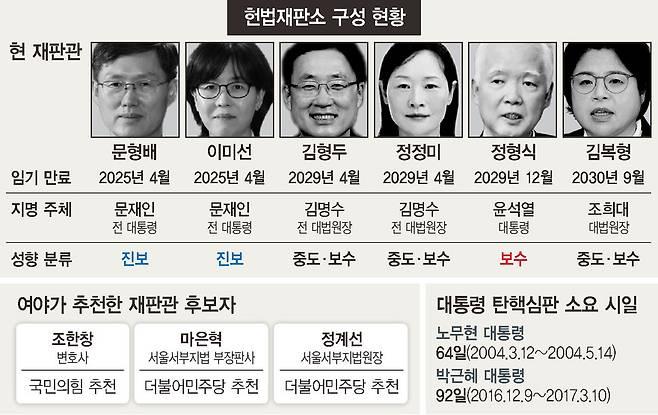헌법 재판관은 대한민국 헌법재판소에서 헌법과 관련된 사건을 심판하는 중요한 역할을 맡고 있는 법관입니다. 헌법재판소는 국가의 헌법질서를 수호하기 위해 설립된 독립적인 기관으로, 헌법의 해석과 적용에 대한 분쟁을 해결하는 역할을 합니다. 헌법 재판관은 이 헌법재판소에서 핵심적인 역할을 담당하며, 그들의 주요 임무는 헌법소원, 법률심사, 정당 해산 심판 등 다양한 헌법적 쟁점에 대해 결정을 내리는 것입니다.

1. 헌법 재판관의 구성
헌법재판소는 9명의 헌법 재판관으로 구성되어 있습니다. 이들은 대통령, 국회, 대법원 등 여러 기관에서 각각 추천된 후, 국회의 인준을 받아 임명됩니다. 헌법 재판관의 임기는 6년이며, 중임이 가능합니다. 이들은 법률, 정치, 사회적 이슈에 대해 균형 잡힌 시각을 갖추고 독립적인 판단을 내릴 수 있는 능력을 요구받습니다.
2. 헌법 재판관의 역할
헌법 재판관은 여러 가지 중요한 역할을 수행합니다. 그 중 주요한 역할은 다음과 같습니다:
• 헌법소원 심판: 개인이나 단체가 자신들의 권리가 침해되었다고 주장하며 헌법 재판소에 청구하는 사건을 심리하고 판결합니다. 예를 들어, 법률이나 행정 처분이 헌법에 위배된다고 판단되면 이를 무효화할 수 있습니다.
• 법률 심사: 법률이 헌법에 위배되는지 여부를 심사하는 역할을 합니다. 법률이 헌법을 위반한다고 판단되면, 그 법률은 무효로 선언될 수 있습니다.
• 정당 해산 심판: 헌법에 위배된다고 판단되는 정당의 활동이나 존재에 대해 해산을 결정할 수 있습니다.
• 탄핵 심판: 대통령, 국무총리, 장관 등 고위 공직자에 대한 탄핵 사건을 심판합니다. 헌법과 법률에 따라 특정 공직자가 직무를 수행할 수 없다고 판단되면, 그 직무를 정지시키거나 해임할 수 있습니다.
• 국가기관 간 분쟁 해결: 국가 기관 간 권한 분쟁이나 헌법적 의무를 이행하지 않는 경우, 이를 심리하고 해결하는 역할도 수행합니다.
3. 헌법 재판관의 임명 과정
헌법 재판관은 총 9명으로 구성되며, 각 헌법 재판관은 다음과 같은 기관에서 추천합니다:
• 대통령: 3명
• 국회: 3명
• 대법원: 3명
헌법 재판관의 임명은 인준 절차를 거쳐야 합니다. 각 기관에서 추천된 후보자는 국회에서 인준을 받기 위해 청문회를 거치며, 국회에서 과반수의 찬성을 얻어야 임명이 확정됩니다. 헌법 재판관은 독립적으로 판단해야 하므로, 정치적 중립성이 중요한 요소로 평가됩니다.
4. 헌법 재판관의 자격 요건
헌법 재판관은 다음과 같은 자격을 갖추어야 합니다:
• 대한민국 국적을 가진 사람
• 법학 박사학위 소지자나 법률 분야에서 15년 이상의 경력을 가진 사람
• 다른 특별한 자격이 요구될 수 있지만, 일반적으로 법률 및 헌법에 대한 깊은 이해와 경험이 요구됩니다.
5. 헌법 재판관의 독립성
헌법 재판관은 그 직무 수행에 있어 정치적 압력이나 외부의 영향을 받지 않도록 독립적인 지위를 보장받습니다. 그들은 직무를 수행하는 동안 임기 동안 어떤 외부적인 간섭도 받지 않으며, 개인적인 이해관계에서 벗어나 공정하고 객관적인 판결을 내야 합니다.
6. 헌법재판소의 기능
헌법재판소는 헌법 해석의 최종적 권위를 가지고 있으며, 그 판결은 모든 국가기관과 개인에게 법적 구속력을 가집니다. 헌법재판소의 판결이 내려지면, 그에 따른 법적 효력이 즉각적으로 발생하고, 법률이나 규정이 개정되거나 무효화될 수 있습니다.
헌법 재판관은 헌법 재판소의 일원으로서 중요한 결정을 내리며, 국가의 헌법 질서를 수호하고 법의 지배 원칙을 실현하는 데 큰 책임을 집니다.
Constitutional
Judges in South Korea
A Constitutional Judge is a key judicial officer in South Korea’s Constitutional Court, responsible for adjudicating constitutional matters. The Constitutional Court is an independent institution established to safeguard the constitutional order of the nation, resolving disputes related to the interpretation and application of the Constitution. Constitutional judges play a central role in this institution, making decisions on cases involving constitutional issues such as constitutional complaints, judicial review of laws, and political party dissolution.
1. Composition of Constitutional Judges
The Constitutional Court consists of nine judges. These judges are nominated by the President, the National Assembly, and the Supreme Court, and they are confirmed by the National Assembly. Each judge serves a six-year term and may be reappointed. They are expected to possess legal expertise, a balanced perspective, and the ability to make independent judgments on complex constitutional and legal matters.
2. Roles and Responsibilities of Constitutional Judges
The main roles of a constitutional judge include:
• Constitutional Complaint Review: Adjudicating cases where individuals or organizations claim that their rights have been violated by unconstitutional laws or administrative actions. If a law or action is found to be unconstitutional, it may be invalidated.
• Judicial Review of Laws: Examining whether laws violate the Constitution. If a law is deemed unconstitutional, it can be declared void.
• Political Party Dissolution: The court can dissolve political parties if they are found to engage in unconstitutional activities.
• Impeachment Decisions: The court handles impeachment cases of high-ranking officials such as the President, Prime Minister, and Cabinet members. If found guilty of misconduct, officials can be removed from office.
• Resolving Disputes Between State Institutions: The court settles disputes over the powers or constitutional obligations of state organs.
3. Appointment Process of Constitutional Judges
The nine Constitutional Court judges are appointed through the following process:
• President: Nominates three judges
• National Assembly: Nominates three judges
• Supreme Court: Nominates three judges
These nominees are subject to a confirmation process by the National Assembly, where they undergo hearings and must be approved by a majority vote.
4. Qualifications of Constitutional Judges
To be appointed as a Constitutional Judge, candidates must meet the following criteria:
• South Korean citizenship
• A doctorate in law or at least 15 years of experience in the legal field
• In some cases, additional qualifications may be required, but deep knowledge and experience in law and the Constitution are essential.
5. Independence of Constitutional Judges
Constitutional judges are guaranteed independence in their judicial duties, meaning they must not be influenced by political pressure or external factors. They are expected to make impartial and objective decisions, free from personal interests, during their term of office.
6. Role of the Constitutional Court
The Constitutional Court is the final authority on constitutional interpretation, and its decisions are legally binding on all state organs and individuals. When the court issues a ruling, it has immediate legal effect, and laws or regulations can be amended or invalidated accordingly.
Constitutional judges play an essential role in upholding constitutional order and ensuring the rule of law in South Korea.
韩国宪法法官
宪法法官是韩国宪法法院中的重要司法官员,负责裁决与宪法相关的案件。宪法法院是一个独立的机构,旨在维护国家的宪法秩序,解决与宪法解释和适用相关的争议。宪法法官在这个机构中扮演着核心角色,裁决涉及宪法问题的案件,如宪法诉讼、法律审查和政党解散等。
1. 宪法法官的构成
宪法法院由9名法官组成。这些法官由总统、国会和最高法院提名,并由国会确认。每位法官的任期为6年,可以连任。宪法法官需要具备法律专业知识、平衡的视角以及做出独立判断的能力。
2. 宪法法官的职责
宪法法官的主要职责包括:
• 宪法诉讼审查:审理个人或团体认为其权利被违反的案件。如果发现某些法律或行政行为违反宪法,它们可以被宣布无效。
• 法律审查:审查法律是否违反宪法。如果法律被认为违宪,它可以被宣布无效。
• 政党解散:如果政党从事违反宪法的活动,法院可以决定解散该政党。
• 弹劾案件:审理总统、总理、内阁成员等高级官员的弹劾案件。如果官员被发现有失职行为,他们可以被免职。
• 解决国家机构之间的争议:法院处理国家机构之间的权力争议或宪法义务问题。
3. 宪法法官的任命程序
9名宪法法院法官通过以下程序任命:
• 总统:提名3名法官
• 国会:提名3名法官
• 最高法院:提名3名法官
这些提名人需经过国会确认程序,进行听证会,并需通过国会的多数投票批准。
4. 宪法法官的资格要求
宪法法官的任职要求包括:
• 拥有韩国国籍
• 法学博士学位或至少15年的法律工作经验
• 在某些情况下,可能需要额外的资格,但深厚的法律和宪法知识是必要的。
5. 宪法法官的独立性
宪法法官在履行职务时享有独立性,这意味着他们不得受政治压力或外部因素的影响。他们必须在任期内做出公正、客观的判断,不受个人利益的干扰。
6. 宪法法院的作用
宪法法院是宪法解释的最终权威,其判决对所有国家机关和个人具有法律约束力。当宪法法院作出裁决时,其法律效力立即生效,相应的法律或规定可以被修改或废除。
宪法法官在维护宪法秩序和确保韩国法治方面发挥着重要作用。